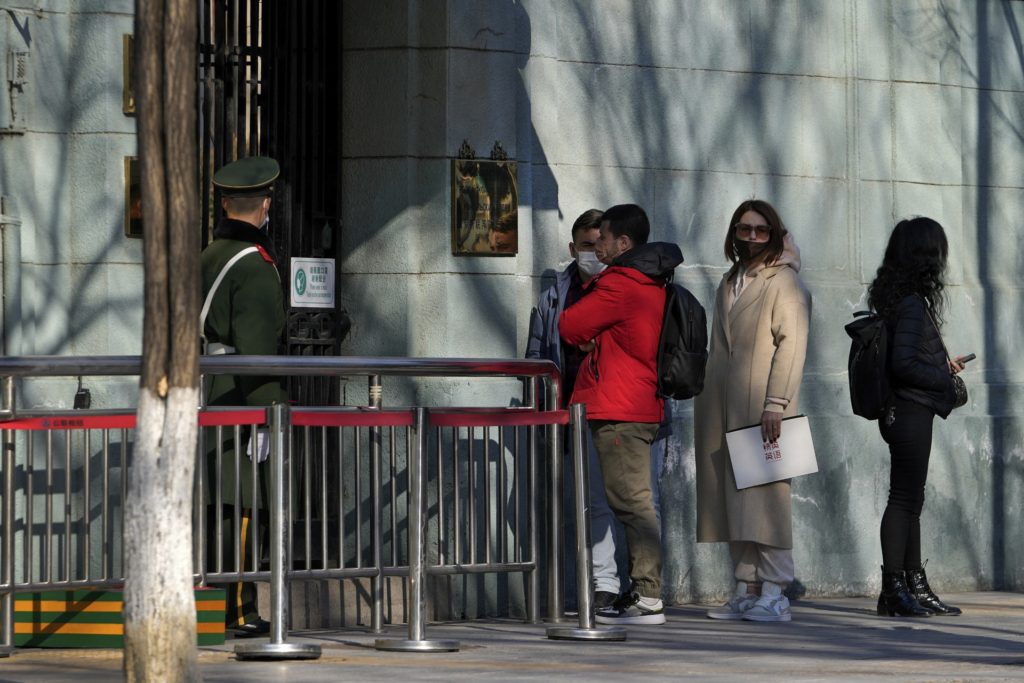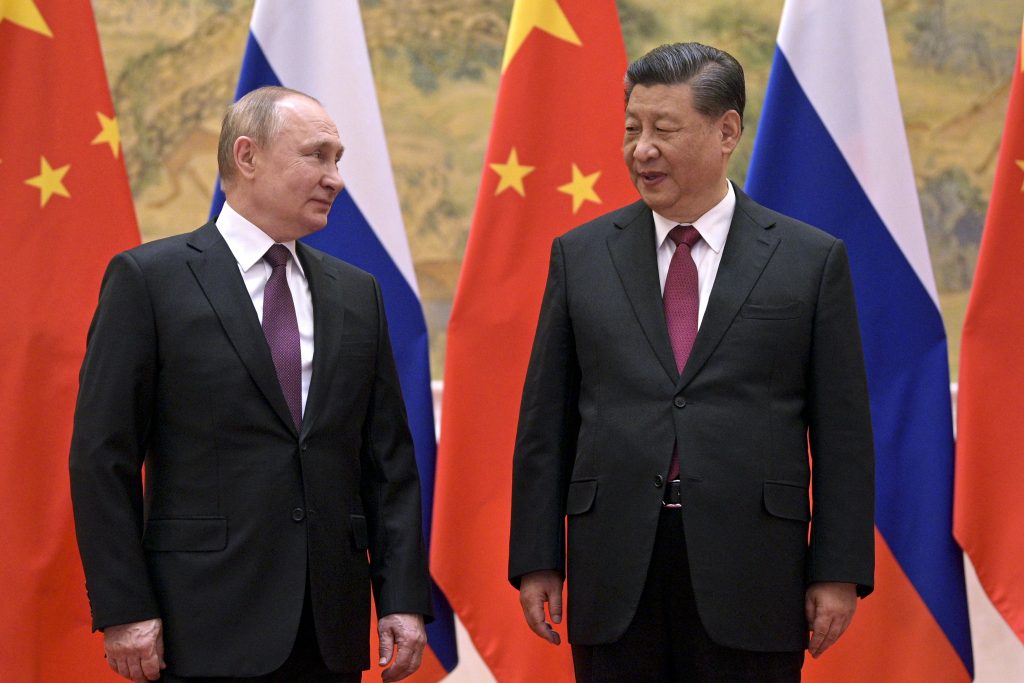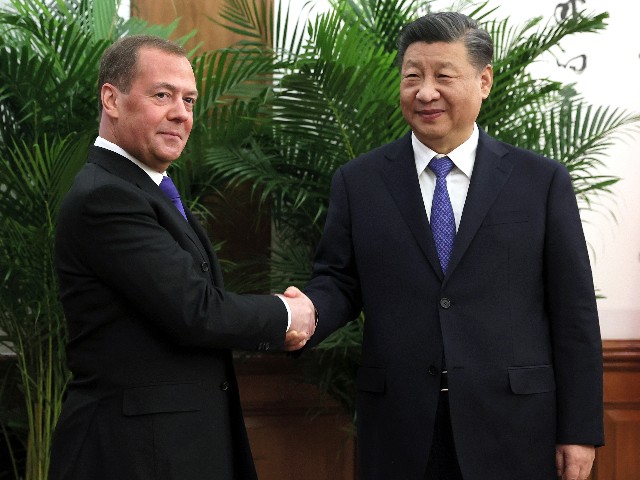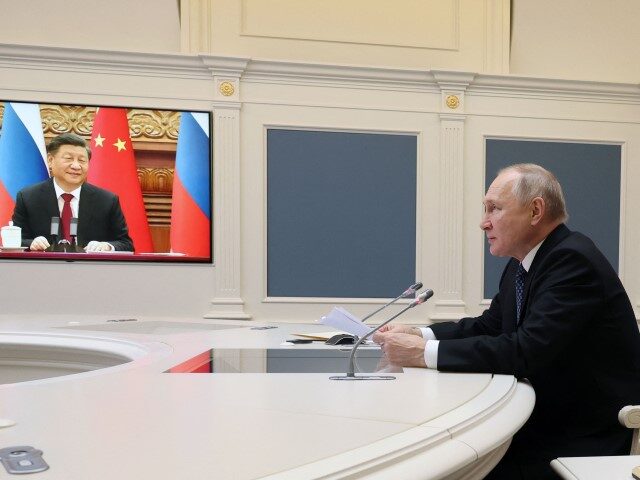Chinese dictator Xi Jinping and his Russian counterpart Vladimir Putin held what is becoming an annual end-of-year video call on Friday to consolidate their alliance and celebrate record levels of trade and other cooperation.
In their publications about the video meeting the Kremlin and the Chinese Foreign Ministry both emphasized trade cooperation and geopolitical opposition to America and the greater West. The Kremlin, which published a partial transcript of Xi and Putin’s conversation, revealed that Putin invited Xi to visit Russia in the spring. The Chinese Foreign Ministry omitted the invitation and included instead a snippet absent from the Kremlin version of the events: that Xi emphasized China’s “impartial position” on Russia’s nearly nine-year-old invasion of Ukraine.
China and Russia are extremely close economic and political allies, typically supporting each other against sanctions taken by the United Nations and other international bodies and meant to dissuade human rights abuses. In the conversation on Friday, Putin thanked Xi for opposing sanctions on Russia, and the Chinese Foreign Ministry emphasized in its readout of the meeting that Xi proclaimed any sanctions on Russia were “doomed to fail.” China has stopped short of supporting Russia’s “special operation” in Ukraine, however, as Ukraine is a member of China’s “Belt and Road Initiative” (BRI), a global infrastructure plan, and a friendly economic partner to Beijing.

A Chinese paramilitary policeman stands watch as people wait to enter the Russian Embassy in Beijing, Thursday, Feb. 24, 2022. China repeated calls for talks to resolve the crisis in Ukraine on Thursday while refusing to criticize Russia’s attack and accusing the U.S. and its allies of worsening the situation. (AP Photo/Andy Wong)
Russia first invaded and colonized part of Ukraine, Crimea, in 2014. In February, Putin announced a “special operation” meant to remove democratically elected President Volodymyr Zelensky and eradicate alleged “Nazis” in the Ukrainian government. Zelensky, who is Jewish, replied to the Nazi accusations by noting his family’s history fighting Nazis in World War II and expressing outrage at the accusation. Zelensky ordered a massive military operation nationwide in which the government distributed tens of thousands of weapons to civilians and taught them how to make Molotov cocktails and other improvised weapons.
Zelensky has suggested that China could profit greatly from rebuilding post-war Ukraine and has requested one-on-one talks with Xi Jinping. Xi has not responded to the invitation to speak at press time.
According to the Kremlin, Putin opened his conversation with Xi by celebrating that Russia and China are “enjoying the best period in their history and can be regarded as a model of cooperation between major powers in the 21st century.”
“Mr. President, my friend, we are expecting you next spring with a state visit to Moscow,” the Kremlin transcript quoted Putin as saying. “This will demonstrate to the whole world how strong the Russian-Chinese friendship is, our agreement on key issues. Your visit will become the main political event of the year in bilateral relations.”
The Chinese Foreign Ministry did not mention any such visit in its readout of the virtual meeting.
Elsewhere in the conversation, per the Kremlin, Putin proclaimed that Russia and China “share the same views on the causes, course and logic of the ongoing transformation of the global geopolitical landscape.”
“In the face of unprecedented pressure and provocations from the West, we defend our principled positions and protect not only our own interests, but also the interests of all those who stand for a truly democratic world order and the right of countries to freely determine their destiny,” Putin asserted.
The Kremlin published a smaller snippet of Xi’s remarks in response that included an invitation to “build up strategic cooperation with Russia, providing each other with development opportunities and remaining global partners for the benefit of our countries and in the interests of stability in the entire world.” Xi did not appear in the transcript as published to respond to the invitation to Moscow.
The Chinese Foreign Ministry, as is to be expected, offered more detail on Xi’s remarks to Putin, though it did not quote Xi or publish any transcribed parts of the meeting. According to the ministry, Xi spent much of the conversation condemning sanctions and vowing political support for Putin.
“President Xi emphasized that the world has now come to another historical crossroads. To revert to a Cold War mentality, provoke division and antagonism, and stoke confrontation between blocs,” he suggested, “or to act out of the common good of humanity to promote equality, mutual respect and win-win cooperation.”
“The tug of war between these two trends is testing the wisdom of statesmen in major countries as well as the reason of the entire humanity,” Xi reportedly said. “Facts have repeatedly proven that containment and suppression is unpopular, and sanction and interference is doomed to fail.”

Chinese President Xi Jinping, right, and Russian President Vladimir Putin talk to each other during their meeting in Beijing, China, Friday, Feb. 4, 2022. (Alexei Druzhinin, Sputnik, Kremlin Pool Photo via AP, File)
“China stands ready to join hands with Russia and all other progressive forces around the world,” the Foreign Ministry continued, paraphrasing Xi, “who oppose hegemony and power politics, to reject any unilateralism, protectionism and bullying, firmly safeguard the sovereignty, security and development interests of the two countries and uphold international fairness and justice.”
Toward the end of the readout, the Chinese Foreign Ministry noted that Xi and Putin “exchanged views on the Ukraine crisis.”
“China will continue to hold an objective and impartial position, work to build synergy in the international community and play a constructive role toward peaceful resolution of the Ukraine crisis,” the readout indicated that Xi told Putin.
Xi and Putin held their conversation after two high-profile displays of support for each other this month: military exercises in the East China Sea that culminated last week, outraging neighboring Japan, and a visit by Putin lackey Dmitry Medvedev to Beijing. During talks between Xi and Medvedev, Beijing also appeared to refrain from expressing any support or enthusiasm for the Ukraine war, offering only hope for “peace.”

Deputy head of Russia’s Security Council and chairman of the United Russia party, Dmitry Medvedev, left, and Chinese President Xi Jinping shake hands during their meeting in Beijing, China, Dec. 21, 2022. (Ekaterina Shtukina, Sputnik, Kremlin Pool Photo via AP)
That absence of full-throated support has been consistent since Russia launched its “special operation” in February. During Putin’s last in-person visit with Xi, in September, Putin admitted that he was aware of and sensitive to Chinese “concerns” about the invasion.
“We highly appreciate the balanced position of our Chinese friends in connection with the Ukrainian crisis,” Putin said during his meeting with Xi. “We understand your questions and concerns in this regard. During today’s meeting, of course, we will explain in detail our position on this issue, although we have spoken about this before.”
The Ukrainian government has been careful to express only a friendly disposition to China despite its close ties to the Russian government, likely a response to China continuing to claim impartiality in the dispute. In March, about a month into the “special operation,” Ukraine’s top diplomat Dmytro Kuleba praised China for maintaining a relationship with Ukraine based on “mutual respect, understanding, and benefit” and said China could “play an important role” in ending the war.
In August, Zelensky himself invited China to help rebuild the country and urged Xi to pick up the phone and speak to him.
“I would like to talk directly. I had one conversation with [President] Xi Jinping that was a year ago,” Zelensky told the South China Morning Post at the time. “Since the beginning of the large-scale aggression on February 24, we have asked officially for a conversation, but we (haven’t had) any conversation with China even though I believe that would be helpful.”
Zelensky also said “Chinese businesses” had a role in rebuilding his country.

COMMENTS
Please let us know if you're having issues with commenting.